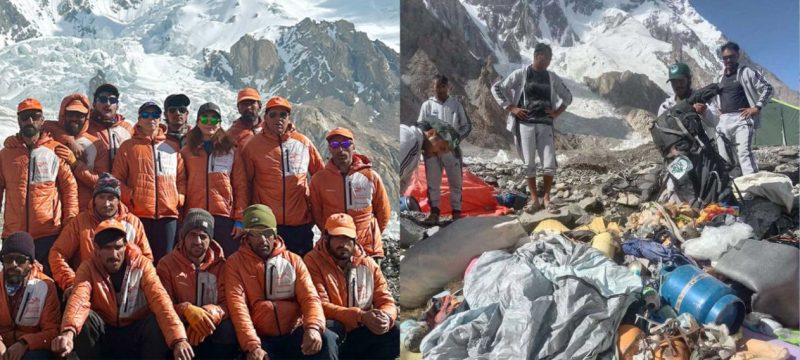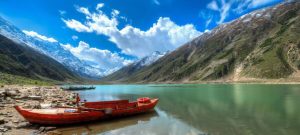A team of professional Mountaineers successfully removed 1.727 tons of waste from 16 mountain sites in northern Pakistan as part of an environmental preservation initiative that ran from June to August, a team member reported on Sunday.
The “Climb2Change” initiative, launched by UAE-based Mashreq Bank, aimed to raise awareness about recycling, waste reduction, and environmental conservation by organizing cleaning expeditions to 14 of the world’s tallest mountains.
Read more: Helicopter Rescue Attempt Fails for Two K2 Climbers
The northern Gilgit-Baltistan (GB) region of Pakistan, known for its stunning valleys and home to five of the world’s 14 peaks over 8,000 meters, including K2, attracts mountain climbers globally.
The team comprised notable mountaineers, including Naila Kiani, Portuguese climber Maria Conceicao, Akbar Hussein, Shabbir Hussein, Bashir Hushe, Basharat Sadpara, and Dilawar Sadpara. Tragically, celebrated Pakistani climber Murad Sadpara, who participated in the expedition, died in August while attempting to summit Broad Peak. The expedition enabled Conceicao to become the first Portuguese woman to successfully climb K2.
“Over an intensive 50-day expedition, we removed 1.727 tons of waste from 16 mountain sites, including the base camps of K2 and Broad Peak and their access trails,” Kiani stated.
She mentioned that 500 kilograms of waste were collected from K2, highlighting the difficulty of the expedition due to the mountain’s challenging altitude. The waste collected included plastics, old ropes, discarded tents, oxygen tanks, wrappers, and soda cans.
“This waste has been handed over to the Central Karakorum National Park department for proper disposal,” Kiani added, noting that the initiative benefitted 47 local businesses and over 200 community members.
The campaign aims to eliminate high-altitude waste while promoting environmental education and sustainable practices among local communities and businesses. Kiani called on the government to implement stricter regulations to prevent further pollution at mountain sites, emphasizing that while one-time clean-up efforts are beneficial, the growing number of visitors will lead to increased waste accumulation.
Syed Yasir Abbas Rizvi, an ecologist at the CKNP department and the focal point for the K2 clean-up, praised the initiative.
“We welcome and support collaboration with the corporate sector, NGOs, and trusts to help maintain the cleanliness of Central Karakorum National Park, known as the Adventurer’s Paradise,” Rizvi told Arab News, referring to the protected area between Skardu and Gilgit in northern Pakistan, which spans 10,557.73 km.
He reported that since 2015, the CKNP has collected 125 tons of solid waste left by around 30,000 visitors and their support crews. As tourism increases, the protected area is facing growing pollution and waste challenges.
“We are committed to a zero-tolerance approach because we must preserve the biodiversity and ecosystems of CKNP, not only for this generation but for future ones,” Rizvi explained.





